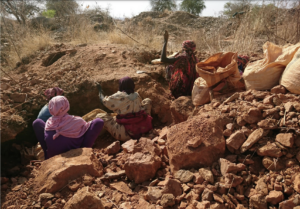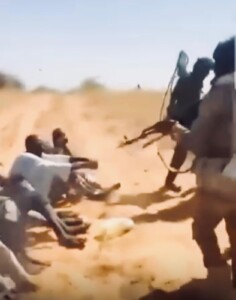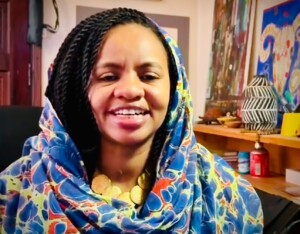Interview with Darfuri agricultural engineer Souad El Tayeb on food security: ‘There is no justification for the current scarcity’
For Radio Dabanga’s Inspirational Women series we spoke with Souad El Tayeb, pioneering agricultural engineer, on her fight for food security in Darfur, the importance of training women, the lack of government support, and being the only woman during her studies at university.

For Radio Dabanga’s Inspirational Women series* we spoke with Souad El Tayeb, pioneering agricultural engineer, on her fight for food security in Darfur, the importance of training women, the lack of government support, and being the only woman during her studies at university.
She was the first woman from her region to study at the University of Khartoum and her master’s degree research project was the first applied scientific research at the University of Khartoum’s Faculty of Agriculture. After her studies, she directed her knowledge and research work to, first and foremost, to serve the people of her region, Darfur.
Now, Souad is a pioneer within the horticultural sector in rural economic development, sustainable food preservation, investment, and trade in Sudan and abroad.
A challenging journey to education
Agricultural engineer Souad El Tayeb Ahmed was born in El Geneina, West Darfur, in 1957. She went to the El Geneina School and then joined the El Fasher Secondary School for Girls. The challenging journey to the secondary school in North Darfur’s capital is one that only those interested in education in her region can undertake.
Souad remembers: "The only girls’ secondary school was closed after the death of two students in an accident on the bumpy road from Zalingei, so the El Fasher school became the nearest secondary school in the area”.
In 1976, Souad joined the Faculty of Agriculture at the University of Khartoum where her original desire was to specialise in ornamental orchards because of her love for flowers. Her trip to the university was an adventurous and unique experience as she was the only girl among nine young students.
'I had reservations about going to study in Khartoum as I was the only girl among a number of young men and society's view of that'
She said: "I had reservations about going to study in Khartoum as I was the only girl among a number of young men and society's view of that… but my father pushed and supported me to go”.
“The journey from El Geneina took days. We arrived in Nyala where we would take the train to Khartoum. We found the train preparing to move, so we had to take a risk or else we would miss the admission test. They sat me in a carriage on a bench with young army soldiers…” An adventure after which she then managed to catch up with the admission procedure.
When Souad arrived in Khartoum for the first time, she did not know anything about the city. She recalls: "The examination was conducted by Dr Sayed Bashir. He was surprised by my desire to study and by the fact that I came all the way from El Geneina to do so, and after he learned that I was the only girl on that journey and why I knew so little about Khartoum, he immediately recommended that I be accepted into the university.”

Famine and her newfound focus on food security
Souad obtained a bachelor’s degree in agriculture with a major in horticulture, her passion, in 1981. Those who follow the different stages of her career will find that she has left an impact at every stage, starting with her first appointment in South Darfur in 1982 where she contributed to the establishment of three plantations in Rahad El Berdi, Buram, and Kabung.
Her work after that, in El Geneina in 1984-1988, changed her original desire in the field of orchards and horticulture towards a vision that combined agricultural development with community support.
Around this period, a great famine and drought hit the area and the scenes at Azurni camp, the first camp for the displaced in El Geneina, had a profound impact on Souad; it gave her a desire and passion to work to the benefit of human development in the region.
'The conditions of the famine changed my ideas and desires from orchards and decoration towards thinking about something that contributes to improving food awareness and security'
"As the displaced returned to their areas, we distributed the seeds. The land was repopulated and great stability was achieved. The conditions of the famine changed my ideas and desires from orchards and decoration towards thinking about something that contributes to improving food awareness and security.”
The most important observations that came out during the period of famine were that residents of areas where fruits, and mangoes in particular, are abundant notice greater stability in their nutritional status. This observation brought Souad to the idea of improving the product and keeping it for longer periods.
Fruit trees are important for the economy and food security in rural areas and have often been the target of militant herders that occupied the lands of Darfuri farmers during the Al Bashir regime.

Her master's scholarship in 1988 at the Faculty of Agriculture of the University of Khartoum was an opportunity for her to work on the scientific application of her thesis ‘the degree of maturity of mango harvesting and preservation by local methods’.
“Going around the famine areas gave me the idea of finding a way to preserve mangoes to be available throughout the season and to preserve them in traditional local ways so that it would not be affected by a lack of electricity. The results were excellent. We had a good indication of how to manage mango production, drying, and preservation for two years."
In 1991, Souad worked to implement the idea with the aim of providing for the needs of families. Several groups of women were trained in West Darfur, in Wadi Saleh, Zalingei and El Geneina in the hope that the state government would adopt the idea and provide aid to women, but “Unfortunately, there was no interest”.
The General Administration of Agricultural Investment was established in western Darfur in 1994 to develop agricultural investment work. Souad has, however, already submitted various feasibility studies for investment projects that never saw the light of day due to the absence of a general strategy to bring about development.
'The state's plans are just drawn up according to the mood of the minister who assumes the tasks of the ministry in the state'
She explained: "The state's plans are just drawn up according to the mood of the minister who assumes the tasks of the ministry in the state".
When the security situation in the state deteriorated further, as it had since 1998, Souad was forced to again leave Darfur for Khartoum in 2002, where she settled.
Finding stability in Khartoum
She came to Khartoum with a strong belief that the horticultural sector could be a pioneering force in the country's economic development.
With a colleague, Souad founded the Horticultural Exports Centre at the Ministry of Agriculture for scientific and international developments. However, they again faced a lack of foundational support and uncommitted local authorities, so no progress was recorded for it.
Between 2003 and 2005, Souad worked at the Khartoum General Administration of Technology and Extension but in 2006 she returned to the Export Office as part of a fruit drying project.
In 2007 she was transferred to the Federal Ministry of Investment’s Agriculture Commissioner until 2012 and then to the General Department of Strategic Planning at the Ministry of Agriculture in Khartoum until 2015.
Yet again, despite her ambitious plans, the intervention of politicians in the implementation of strategies and plans prevented the desired developments.
In those years, however, Souad did manage to publish several articles on the optimal preservation and harvesting methods for mangoes.

Mango and rural development strategy
"I devoted myself to preparing a PhD thesis at the Faculty of Development Studies of the University of Khartoum in 2016 with a research proposal on home-processing methods to dry mangoes as a strategy for rural development in West Darfur. The research is based on an applied study on the production chains of mango crops and the practical application of drying”.
“In the field study that took place in 2019-2020, groups of women were trained in three centres in El Geneina, Ardamata, and Kendebe on how to prepare mangoes, making rolls, slices, and chips. There was a specific focus on how to achieve this in areas where there is no electricity, preserving the mangoes with natural materials and storing them in local ways, using ceramic containers and cartons.”
“These areas were able to produce mango slices commercially and have them available even in non-mango seasons. It has greatly contributed to increasing families' income and to increase personal consumption, especially to feed children”.
The trainees even found the opportunity to market their preserved mangoes in neighbouring countries. “There is a desire for cross-border trade movement with Chad to sell mangoes and an agreement has already been made”, Souad explains.
Souad benefited here from her previous experiences with the official authorities not to rely on them but to rely on her own resources to provide for women’s needs.
From her own farm of mango trees and her own family home, she provided the materials for the training centres in El Geneina and Ardamata. As for the Kendebe Centre, she sought the assistance of the Community Development Association.
Scientific and external contributions
Throughout her career, Souad published many papers in scientific journals through which she was able to present herself to the world as an expert in drying and preserving fruits and crops.
“In 1991, I participated in a presentation on mango production in Germany with the Friedrich Ebert Foundation, which found the support of investors, but the step did not move forward due to the lack of implementation by the state”.
In 2008, she participated in a training course for the African and Asian countries in Malaysia on tropical fruits and post-harvest treatments as a trainer to transfer her knowledge on mango drying and preservation in Sudan.
Souad is still trying to expand and implement her aspirations to develop a state strategy to provide infrastructure to create an environmentally and economically sustainable mango production and trade chain, linking Darfur to international markets.
'The loss of crops exceeds 50 per cent at the moment whilst mangoes could be a secure product that helps fight poverty and hunger if we direct our energies towards rural economic development'
“It is necessary to study the development of production chains for improved and globally desirable varieties and preservation methods. The loss of crops exceeds 50 per cent at the moment whilst mangoes could be a secure product that helps fight poverty and hunger if we direct our energies towards rural economic development… There is no justification for the current scarcity of crops and agricultural commodities, as all agricultural products can be preserved in different secure formats”, she said.
'There is no justification for the current scarcity of crops and agricultural commodities, as all agricultural products can be preserved in different secure formats”'
Food crises
Sudan has witnessed various famines and food shortages. Earlier this year, one of the leaders of the displaced in Kalma camp in South Darfur said that the most prominent challenge faced by the displaced in Darfur at the moment is an acute shortage of food.
The Famine Early Warning Systems Network reported in January that “staple food prices continued increasing atypically” in Sudan between December and January and were more than double compared to last year and over five times greater than the five-year average.

(Sari Omer / OCHA)
An estimated 7.1 million people were food insecure last year, according to the latest WFP Sudan Integrated Food Security Phase Classification analysis (July 2020). This is an increase of 65 per cent compared with 2019.
This summer, UN Office for the Coordination of Humanitarian Affairs (OCHA) reported that food prices continue to rise, which is a bad omen for displaced people, especially in Darfur.
* More from the Inspirational Women series:
Interview with Awadiya Abbas: Women’s union organiser and revolutionary
Interview with novelist Sara El Jak on literature, womanhood, and empowerment
Interview with Nuba Kandaka Safaa Tutu: A Story of Resilience and Struggle
Interview with Nisreen El Saim: The December Revolution's Kandaka and a global climate activist











 and then
and then